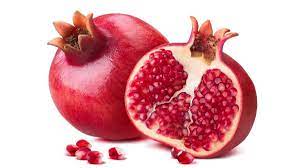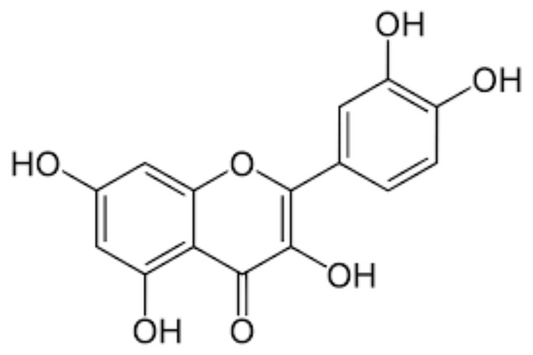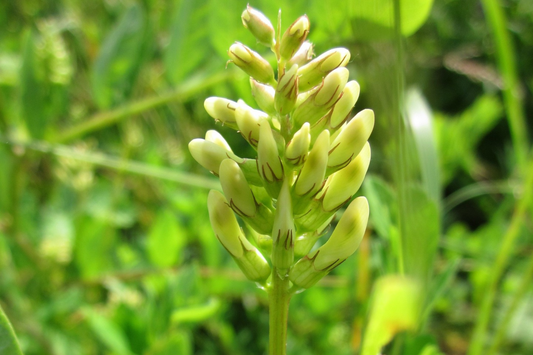Benefit Tips
Quercetin is a plant pigment (flavonoid) commonly found in many plants and foods, such as red wine, onions, green tea, apples, berries, and broccoli. It is known for its antioxidant and
anti-inflammatory properties.
- Animal studies have indicated that quercetin can increase endurance exercise capacity by up to 40%.
- Antioxidant Properties: Quercetin has been shown to neutralize harmful free radicals in the body. In some studies, quercetin supplementation led to an increase in antioxidant capacity by up to 29%.
- Blood Pressure Reduction: There is evidence to suggest that quercetin might help lower blood pressure. In one meta-analysis, quercetin supplementation resulted in a reduction of systolic and diastolic blood pressure by 3.09 mmHg and 2.86 mmHg, respectively.
- Anti-Inflammatory Effects: Quercetin may reduce inflammation, which is implicated in various chronic diseases. Research in animals showed reductions in inflammatory markers, such as TNF-alpha, by 50% or more with quercetin supplementation.
- Allergy Symptom Relief: Quercetin is believed to have antihistamine properties, which can help reduce the symptoms of allergies. Specific statistics can vary widely based on individual conditions and dosages.
- Improved Endurance Exercise Performance: Some studies suggest that quercetin might boost endurance exercise performance. One study demonstrated an improvement in cycling time trial performance by 3.1% after quercetin supplementation.
- Neuroprotective Effects: Quercetin may have protective effects against neurodegenerative diseases. In animal models, quercetin supplementation has shown a reduction in markers of oxidative stress in the brain by up to 49%.
- Anti-Cancer Properties: There are indications that quercetin might have anti-cancer properties by inducing cell death in certain cancer cell lines. In vitro studies show a reduction of cancer cell viability by 75% in some cases, but it's essential to note that in-vitro results don't always translate directly to in-vivo effectiveness.
-
Improved Metabolic Health:
Quercetin may have benefits for metabolic health, particularly in the context
of obesity and diabetes. Animal studies showed reductions in body weight by up to 23% and improved insulin sensitivity with quercetin supplementation.
Quercetin:
Quercetin is a flavonoid, a type of plant pigment found in many fruits and vegetables. It has been gaining attention in recent years for its potential role in anti-aging. Studies have shown that quercetin has a range of health benefits, including reducing inflammation, improving cardiovascular health, and even fighting cancer. In this article, we will explore quercetin's role in anti-aging and how it can help us maintain our health as we age.
One of the key ways that quercetin may contribute to anti-aging is through its ability to support mitochondrial function. Mitochondria are small organelles within cells that are responsible for producing energy. As we age, our mitochondria become less efficient, which can lead to a variety of health problems, including fatigue and age-related diseases. Quercetin has been shown to stimulate the growth and division of mitochondria, helping to keep them functioning at optimal levels.
In addition to its effects on mitochondrial function, quercetin is also a potent antioxidant. Antioxidants are substances that protect cells from damage caused by free radicals, which are unstable molecules that can cause oxidative stress and contribute to aging and disease. Quercetin has been shown to reduce oxidative stress and inflammation, which are two of the key drivers of aging.
Another way that quercetin may contribute to anti-aging is through its ability to activate a gene called SIRT1 which is involved in a variety of cellular and molecular processes and pathways, with distinct cellular localization and molecular targets. By activating this gene, quercetin may help to improve metabolic health and prevent age-related diseases such as cardiovascular diseases and obesity.
Quercetin has also been shown to have anti-cancer properties. Studies have found that quercetin can inhibit the growth of cancer cells and even induce apoptosis, or programmed cell death, in cancer cells. This may be due to quercetin's ability to reduce inflammation and oxidative stress, which are both known to contribute to the development and progression of cancer.
Finally, quercetin may also help to eliminate aging cells, a process known as senescence. As we age, our cells become less able to divide and replicate, which can lead to the accumulation of senescent cells in the body. These cells produce inflammatory molecules that can damage nearby cells and tissues, contributing to aging and age-related diseases. Quercetin has been shown to help eliminate these aging cells, reducing inflammation and improving overall health.
In conclusion, quercetin is a powerful antioxidant and anti-inflammatory compound that has many potential health benefits. Its ability to support mitochondrial function, activate SIRT1, and eliminate aging cells make it a promising candidate for anti-aging interventions. While more research is needed to fully understand quercetin's mechanisms of action, it is clear that this flavonoid has the potential to improve our health and extend our lifespan. Incorporating quercetin-rich foods such as onions, apples, and berries into our diets, or taking a quercetin supplement, may be a simple yet effective way to support anti-aging and maintain our health as we age.
References:




